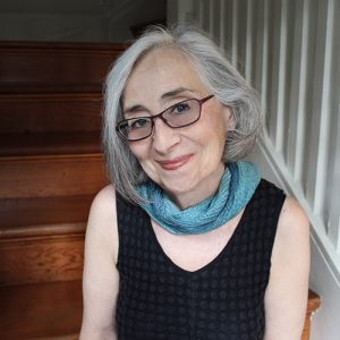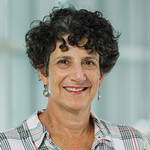Feminist Journey into Prayer
Nov. 2, 2017
By Amy Sessler Powell
"Let us bless the source of life that brings forth bread from the earth" or "Our praise to You, Eternal our God, Sovereign of the universe, Who brings forth bread from the earth?"
At 7:30 p.m. Nov. 6, Marcia Falk will discuss and read from the new anniversary edition of "The Book of Blessings" as well as "The Days Between." At noon Nov. 7, HBI Director Lisa Fishbayn Joffe will interview Falk in a live webinar "Conversations with Extraordinary Women." Co-sponsored with the Schusterman Center for Israel Studies, JFAB.
 The first, a translated version of "hamotzi," the Jewish blessing before the meal, comes from Marcia Falk's "Book of Blessings." The second is the traditional translation of the same prayer, in this case provided by ReformJudaism.org. It's a simple, yet elegant example of Falk's style of removing the patriarchal language from the liturgy.
The first, a translated version of "hamotzi," the Jewish blessing before the meal, comes from Marcia Falk's "Book of Blessings." The second is the traditional translation of the same prayer, in this case provided by ReformJudaism.org. It's a simple, yet elegant example of Falk's style of removing the patriarchal language from the liturgy.
The story of Falk's engagement with writing prayer began several decades before she published her groundbreaking books including "The Book of Blessings: New Jewish Prayers for Daily Life, the Sabbath, and the New Moon Festival," now reissued in a 20th anniversary edition.
"The words of prayer have always mattered to me," said Falk. "As a Jewish feminist in the 1970s and '80s, I thought it was important not just where and how we participate in synagogue life, but what we actually pray there. I had been a regular davener for years; I belonged to synagogues and attended services every Shabbat. I participated, gave drashot (talks about the Torah portion). But in the early 1980s, the liturgy was becoming more and more disturbing to me as a Jew and a feminist trying to live with integrity.
"I was in crisis. The liturgy wasn't speaking for me, and in many ways I found it hurtful. But I didn't want to give up my relationship to my community; I was attached to being a Jew in the Jewish world."
Falk started to silently change the language, sometimes while on her feet during the Amidah (the prayer recited silently, while standing). She was often the last one to sit back down, because she lost track of time as she struggled to adapt the Hebrew words, changing the patriarchal image of God as the Lord and King to other, gender-neutral metaphors. She was not yet writing her new prayers down or sharing them publicly.
A turning point came in 1983, while she was a teacher at the Havurah Institute in Princeton. Rabbi Arthur Waskow was in charge of the Havdalah service to take place on Saturday night, and on Friday afternoon he asked Falk to provide a kavanah, meditation, for each of the blessings.
"I told Art I just couldn't do that, and when he asked why, I blurted out that I didn't say those blessings any more. That was the first time I said aloud that I no longer prayed with the traditional words. Without missing a beat, Art said, as if it were the most obvious thing in the world, '‘So write your own blessings.' I told him I thought they'd stone me. 'Marcia,' he said in a booming voice, 'they won't stone you.'
"So I sat down that afternoon and wrote my first four blessings, and the next night, full of trepidation, I recited them before a community of 300 Jews ranging in affiliation from atheist to Orthodox. I recited the new words without introduction, as though they had been written a couple of millennia ago by the rabbis, rather than the day before, by me. I offered no apology or explanation (I didn't dare to), and, to my puzzlement and disbelief, the community said, Amen."
In March 1985, Falk published an essay in Moment Magazine, in which she presented some of her new blessings, which would eventually become part of her path-breaking "Book of Blessings," published in 1996. The article engendered strong and voluminous reactions across the spectrum; Falk received fan mail as well as attack mail. While there were many Jews, especially Jewish women, who had been waiting for an alternative to the patriarchal imagery of the prayer book and who were thrilled that Falk had met the challenge, there were also people who insisted that she did not have the right to make changes, especially to the Hebrew. But, Falk says, Jewish liturgy has always changed over time. "If it doesn't evolve, it ossifies." And Falk believes it is not enough to change the English. Her work is unique in that it offers new prayers in Hebrew poetic language.
"Many Jews want a liturgy that expresses their values and concerns. Keeping it alive in a fresh way has always been part of Jewish tradition," she says.
It has been 20 years since the publication of "The Book of Blessings," and Falk's readers have waited long for its sequel. Now, it's here with new essays by scholars Rabbi Sue Levi Elwell, Rabbi Naamah Kelman, Rabbi Dalia Marx and Rabbi David Ellenson that reflect on the impact over the past 20 years.
Rabbi David Ellenson, director of the Schusterman Center for Israel Studies at Brandeis University said in one of the afterwords, "It is not too much to say that the publication of 'The Book of Blessings' in the last decade of the 20th century revolutionized and revivified the foundations of Jewish liturgy."
Rabbi Sue Levi Elwell noted in another afterword, "All who want to sing a new song to God are in Marcia Falk's debt."
 Amy Powell is the assistant director of communications for HBI. Portions of this blog were adapted from an 2013 Fresh Ideas blog.
Amy Powell is the assistant director of communications for HBI. Portions of this blog were adapted from an 2013 Fresh Ideas blog.